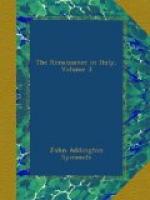If Michael Angelo could ever have been handsome is more than doubtful. Early in his youth the quarrelsome and vain Torrigiani broke his nose with a blow of the fist, when they were drawing from Masaccio’s frescoes in the Carmine together.[340] Thenceforth the artist’s soul looked forth from a sad face, with small grey eyes, flat nostrils, and rugged weight of jutting brows. Good care was thus taken that light love should not trifle with the man who was destined to be the prophet of his age in art. Like Beethoven, he united a loving nature, sensitive to beauty and desirous of affection, with a rude exterior. He seemed incapable of attaching himself to any merely mortal object, and wedded the ideal. In that century of intrigue and amour, we hear of nothing to imply that Michael Angelo was a lover till he reached the age of sixty. How he may have loved in the earlier periods of his life, whereof no record now remains, can only be guessed from the tenderness and passion outpoured in the poems of his latter years. That his morality was pure and his converse without stain, is emphatically witnessed by both Vasari and Condivi.[341] But that his emotion was intense, and that to beauty in all its human forms he was throughout his life a slave, we have his own sonnets to prove.
In the year 1534 he first became acquainted with the noble lady Vittoria, daughter of Fabrizio Colonna, and widow of the Marquis of Pescara. She was then aged forty-four, and had nine years survived the loss of a husband she never ceased to idolise.[342] Living in retirement in Rome, she employed her leisure with philosophy and poetry. Artists and men of letters were admitted to her society. Among the subjects she had most at heart was the reform of the Church and the restoration of religion to its evangelical purity. Between her and Michael Angelo a tender affection sprang up based upon the sympathy of ardent and high-seeking natures. If love be the right name for this exalted and yet fervid attachment, Michael




